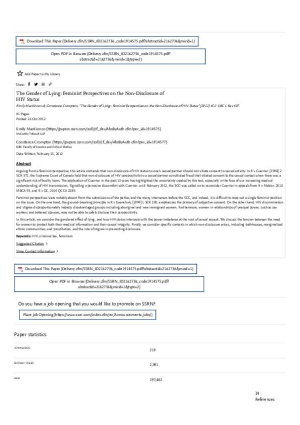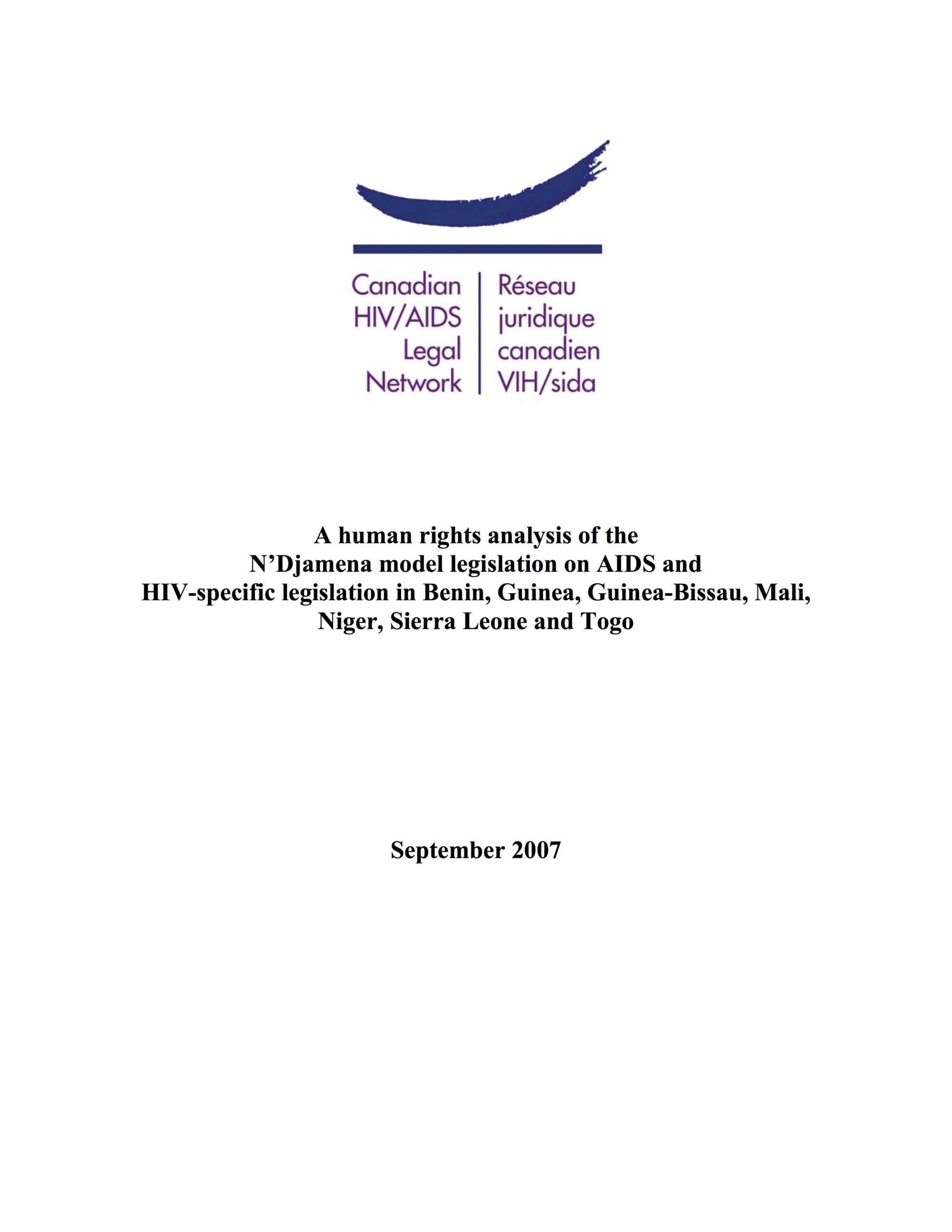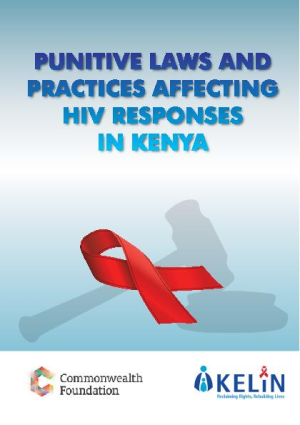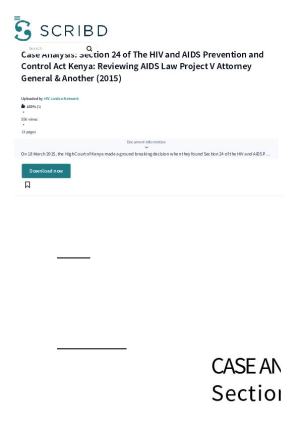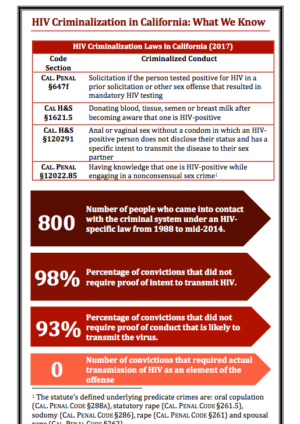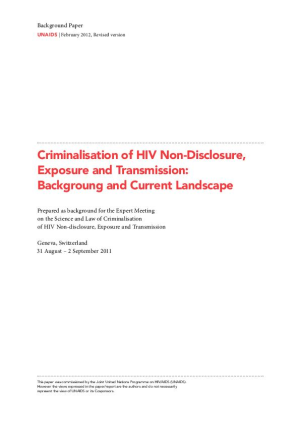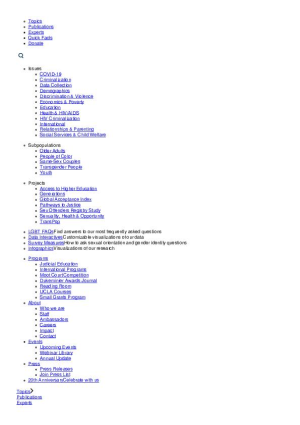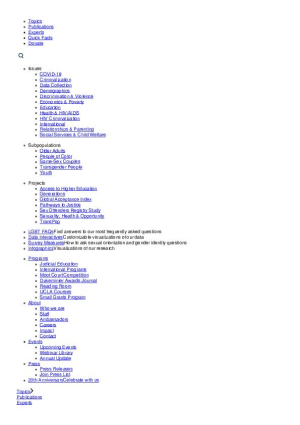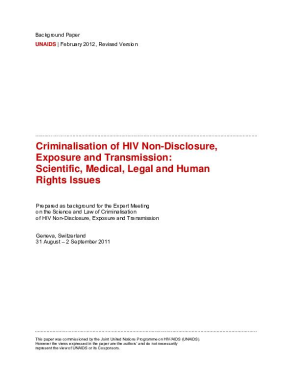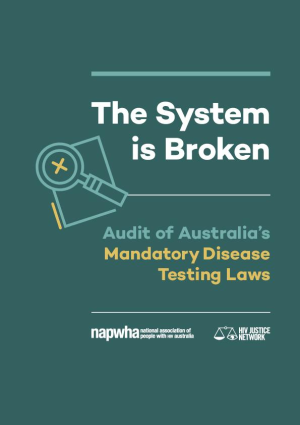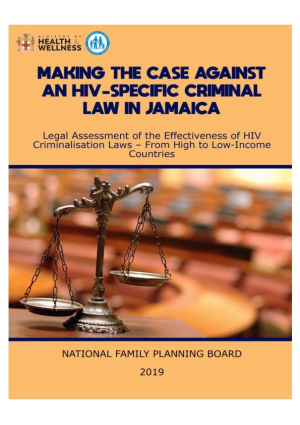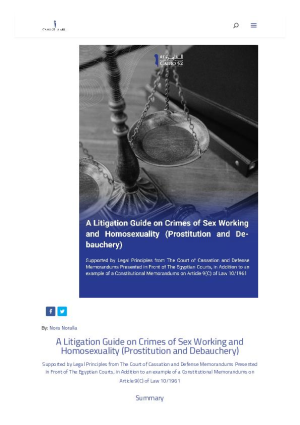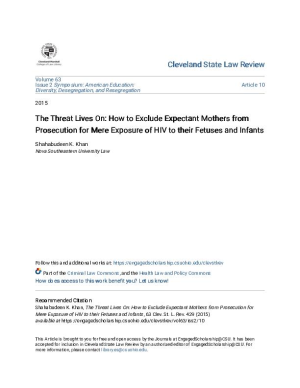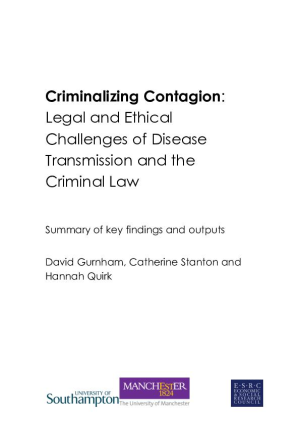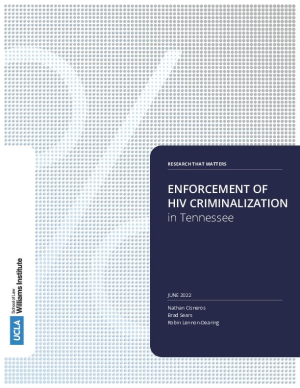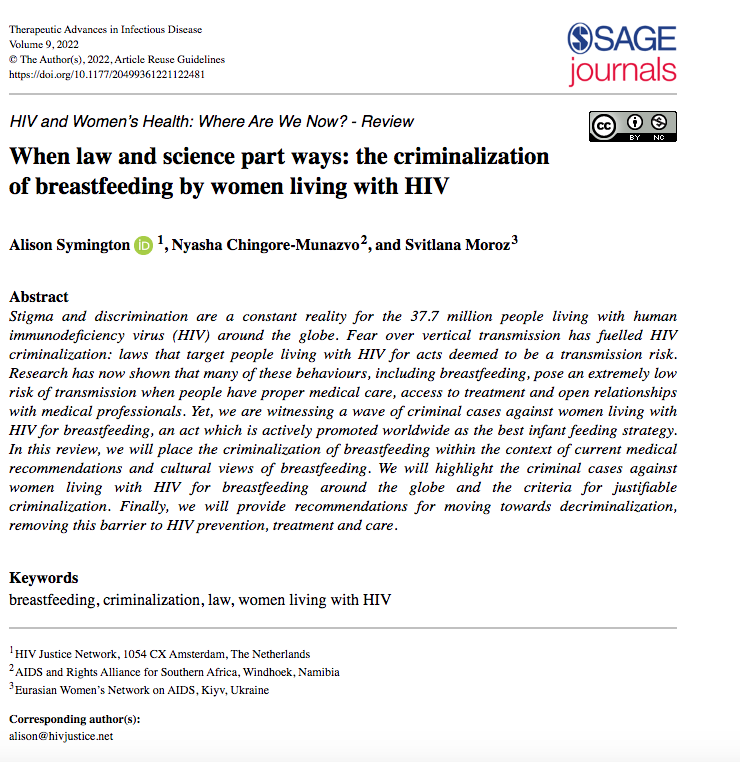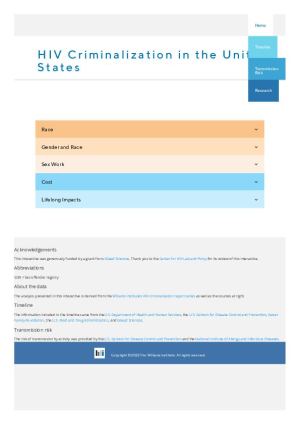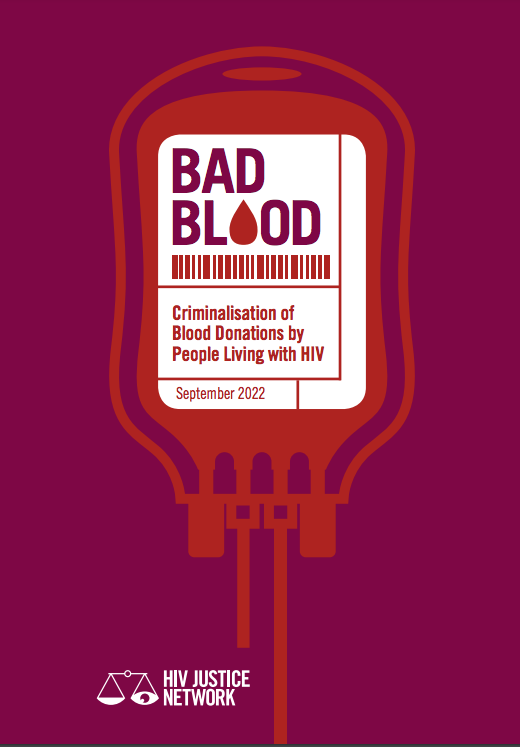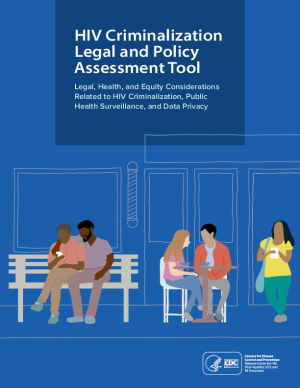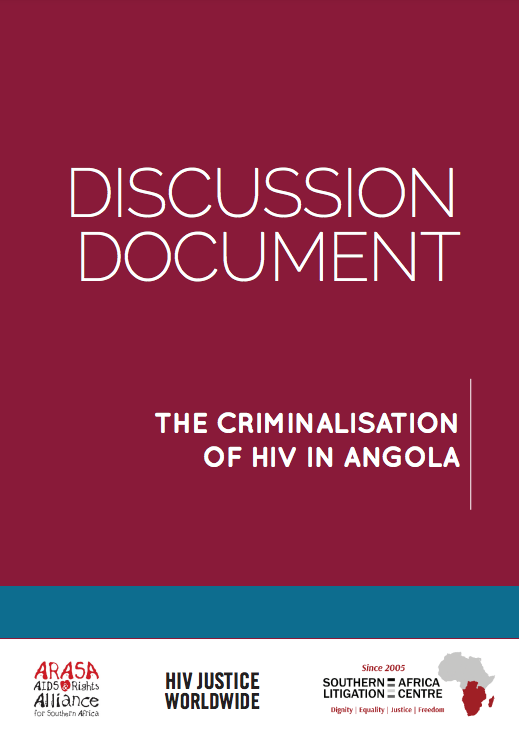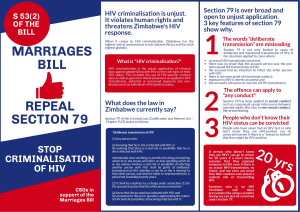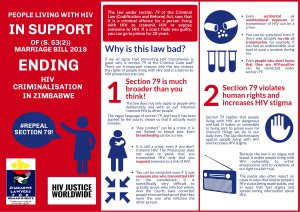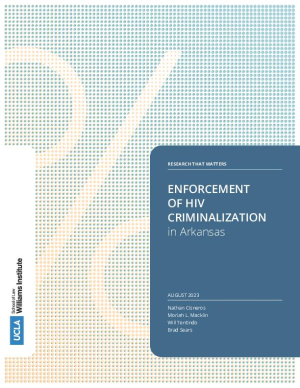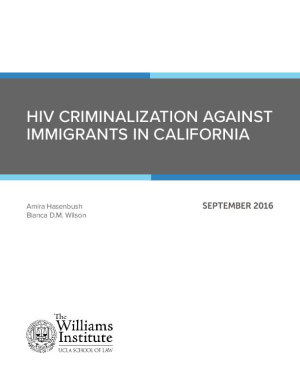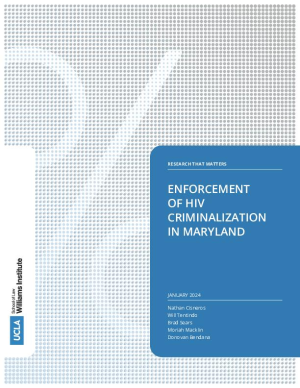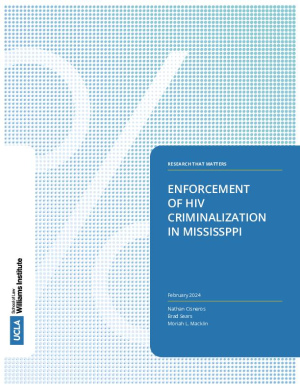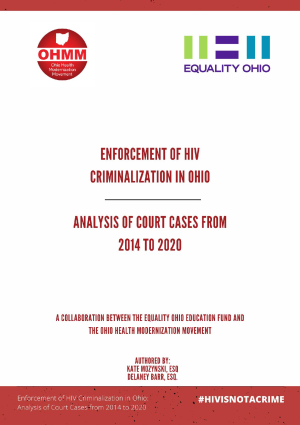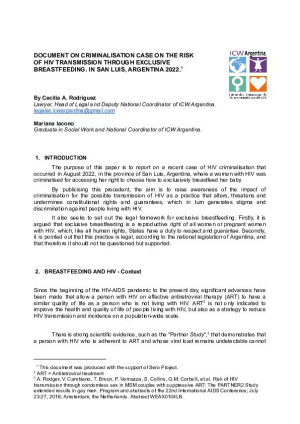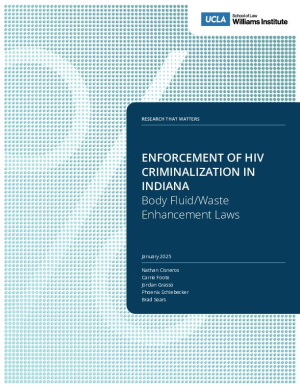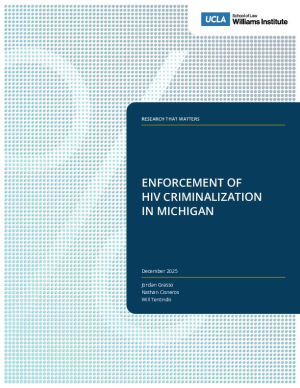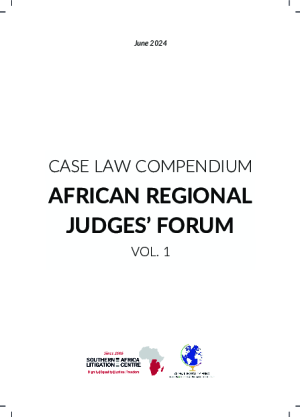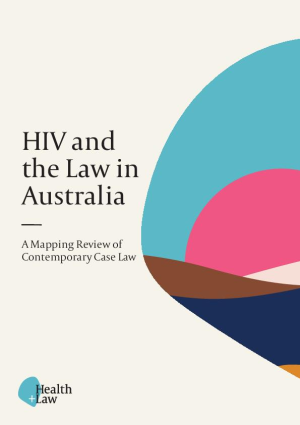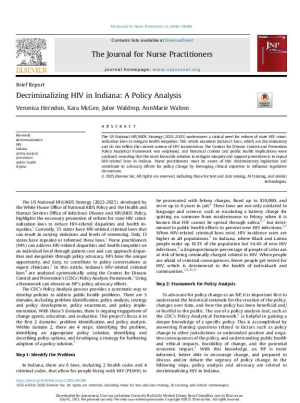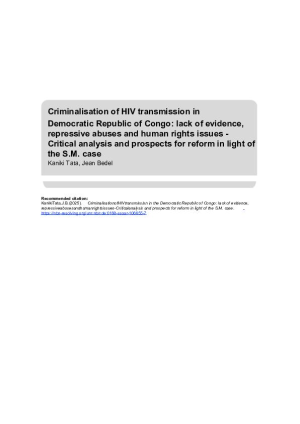Opposes laws that base criminal liability and/or penalty on HIV status, rather than intent to harm. Argues that focus on knowledge of status as a key element of an HIV-related crime rather than intent and capacity to transmit the virus, is a classic example of an inadequate mens rea (or criminal intent) requirement and overly expansive criminalization.
Law, cases and legal analysis
Legal analysis and critiques
The gender of lying: Feminist perspectives on the non-disclosure of HIV status
Arguing from a feminist perspective, this article contends that non-disclosure of HIV status to one’s sexual partner should not vitiate consent to sexual activity. Considers the gendered effect of lying, and how HIV status intersects with the power imbalance at the root of sexual assault. Discusses the tension between the need for women to protect both their medical information and their sexual integrity. Also considers the role of stigma in preventing disclosure.
Disparate risks of conviction under Michigan’s felony HIV disclosure law: An observational analysis of convictions and HIV diagnosis, 1992-2010
Found uneven application of HIV criminalization laws in the state of Michigan, with black men and white women having a comparatively greater risk of conviction than white men or black women. White women had the highest conviction rate of any group analysed, suggesting they may face a particular burden under these laws. Many of the white women convicted were especially disadvantaged by issues such as poor mental health, substance abuse and homelessness.
A human rights analysis of the N’Djamena model legislation on AIDS and HIV-specific legislation in Benin, Guinea, Guinea-Bissau, Mali, Niger, Sierra Leone and Togo.
Detailed information and analyses of HIV-specific legislation in seven Central and West African countries from a human rights perspective. Provides commentary on N’Djamena model legislation on HIV/AIDS (2004).
HIV-specific legislation in sub-Saharan Africa: A comprehensive human rights analysis
Analyses key provisions in HIV-specific laws, outlining both protective and punitive provisions including criminalisation of HIV non-disclosure, exposure and transmission. Argues these provisions are generally overly broad, disregarding the best available recommendations for legislating on HIV; failing the human rights test of necessity, proportionality and reasonableness; consecrating myths and prejudice; and undermining HIV responses.
Punitive laws and practices affecting HIV responses in Kenya
Analyses punitive laws and policies undermining the effective delivery of services to PLHIV and those at risk of HIV infection. Flags laws and policies that violate Constitutional rights. Sets out an advocacy agenda for policy and legislative reform and improvement of law enforcement practices and community understanding of criminalisation issues.
Case Analysis: Section 24 of the HIV and AIDS Prevention and Control Act Kenya: Reviewing AIDS Law Project v Attorney General and Another (2015)
Overview of the Kenya High Court’s ground-breaking decision that some terms in the HIV and AIDS Prevention and Control Act were too broadly defined and that Act contravened Kenya’s constitution.
HIV Criminalization in California: What We Know
Highlights significant findings about Californian criminal law including that more than 800 people have come in contact with California’s criminal system based on their HIV status, with 93% of convictions requiring no proof of conduct likely to transmit HIV. Also finds HIV criminal statutes are disparately enforced based on race/ethnicity, sexuality and gender.
Criminalisation of HIV Non-Disclosure, Exposure and Transmission: Background and Current Landscape
This paper was commissioned by the UNAIDS Secretariat to serve as a background paper for the Expert Meeting on Criminalisation of HIV Non-Disclosure, Exposure and Transmission, 31 August – 2 September 2011, Geneva, Switzerland.
HIV Criminalization in Florida – Penal Implications for People Living with HIV/AIDS
Provides an overall understanding of the enforcement of HIV criminalization laws in Florida and assesses any preliminary findings indicating disparities between subpopulations. Preliminary analyses found that there is evidence of disparities in enforcement of HIV criminalization laws related to geography, race/ethnicity, sex at birth, or sex worker (or suspected sex worker) status and underlying related offenses.
HIV Criminalization in Georgia: Penal Implications for People Living with HIV/AIDS
Analyses how HIV criminalisation laws in Georgia have been utilised and assesses preliminary findings on disparities between sub-populations. Found that there might be disparities in enforcement of HIV Criminalisation laws related to geography, race/ethnicity, sex at birth or sex worker (or suspected sex worker) status.
Criminalisation of HIV Non-Disclosure, Exposure and Transmission: Scientific, Medical, Legal and Human Rights Issues
This paper was commissioned by the UNAIDS Secretariat to serve as a background paper for the Expert Meeting on Criminalisation of HIV Non-Disclosure, Exposure and Transmission, 31 August – 2 September 2011, Geneva, Switzerland. It synthesises general considerations concerning issues raised by the application of the criminal law to non-disclosure, exposure or transmission in relation to HIV Scientific, Medical, Legal and Human Rights Issues.
The System Is Broken – Audit of Australia’s Mandatory Testing Laws
Audit, led by Sally Cameron, HIV Justice Network’s Senior Policy Analyst, on behalf of HJN and the National Association of People with HIV Australia (NAPWHA) revealing that mandatory testing laws are at odds with national HIV testing policy and are operating outside the structured and highly successful HIV responses managed by clinicians and departments of health. The audit found that in many instances, the laws, their implementation, and monitoring include numerous structural failures, usually occurring in multiple states.
Making the case against an HIV-specific law in Jamaica
This assessment ‘Legal Assessment of the Effectiveness of HIV Criminalisation Laws-from High to Low-Income Countries’ demonstrates why the enactment of an HIV-specific criminal law in Jamaica would be harmful to the national HIV response. It sets out the bases on which the recommendation for an HIV-specific criminal law should be rejected and highlights the need for public health policy considerations to centre the discussions surrounding HIV criminalisation in Jamaica.
A Litigation Guide on Crimes of Sex Working and Homosexuality
This an English Summary of the book “A Litigation Guide on Crimes of Sex Working and Homosexuality (Prostitution and Debauchery) “. The book aims to provide a litigation guide and a legal overview of principles and procedures to legal advocates and whoever wishes to know more about “prostitution” or “debauchery” crimes under Egyptian law.
The Threat Lives On: How to Exclude Expectant Mothers from Prosecution for Mere Exposure of HIV to their Fetuses and Infants (2015)
This article articulates how the threat of prosecution of mothers living with HIV who expose or transfer the virus to their foetuses or newborn will discourage and scare women away from seeking proper medical treatment instead of encouraging HIV treatment and prevention. It also explores how HIV-specific criminal transmission laws in the United States could hamper and stifle the progress in prevention and treatment of vertical transmission. It concludes by proposing a model for change in addressing these HIV-specific criminal transmission statutes.
- Alternative links
- Traduction française automatisée
Criminalizing Contagion: Legal and Ethical Challenges of Disease Transmission and The Criminal Law Summary of Key Findings and Outputs (Nov 2014)
This seminar series1 addressed a series of questions and brought together experts from a range of disciplines to answer them. This document summarises the arguments of each of the papers presented over the course of this seminar series, gives details of outputs connected to it, and also provides information on how and by whom we anticipate findings being used.
Enforcement of HIV Criminalization in Tennessee
Williams Institute analysis of data from the state of Tennessee about individuals who were convicted of an HIV crime and placed on the state’s sex offender registry (SOR). In addition to the registry data, the report also analyses detailed data from 77 case files of those on Tennessee’s SOR who resided and were prosecuted in Shelby County, home of Memphis.
Redefining Risk: Judicially Heightened Risk Standards and HIV-Specific Criminal Laws
This Note explains the risk of HIV transmission associated with certain behaviours, lays out variations in HIV-specific criminal laws, and examines how those laws are applied. It also examines the courts’ reasoning in Rhoades and Hogg as well as analyzes the legal and policy problems that these laws create, the challenges to amending or repealing the laws.
When law and science part ways: the criminalization of breastfeeding by women living with HIV
In this study, the authors place the criminalisation of women with HIV for breastfeeding within the context of current medical recommendations and cultural views of breastfeeding. They review the criminal cases against women living with HIV for breastfeeding around the globe, examine the injustice of these prosecutions, and provide recommendations for decriminalisation.
HIV Criminalization in the United States
Interactive tool looking at the impact of HIV criminal laws on people living with HIV in nine US states: California, Florida, Georgia, Kentucky, Louisiana, Missouri, Nevada, Tennessee, Virginia.
Bad Blood: Criminalisation of Blood Donations by People Living with HIV
Following recent reports of blood donation-related prosecutions in Russia, Singapore, and the United States, the HIV Justice Network undertook desk-based research, collating and categorising all known country and jurisdictional laws that specifically criminalise blood donations by people living with HIV, and known prosecutions under these laws. We analysed these laws and cases using a global policy guidance and human rights law framework, informed by international and state-level scientific data assessing risks of transmission via blood transfusion.
Is the decision by the constitutional court of Uganda in UGANET & 2 others v. Attorney General in tandem with global decisions on criminalization of HIV/AIDS transmission?
On 8th November 2022 the Constitutional Court of Uganda handed down a decision that has been perceived as contrary to addressing inequalities and helping to end AIDS, as the provisions of the HIV and AIDS Prevention and Control Act, 2015 that were being challenged in the petition, perceived as discriminatory, criminalising HIV/AIDS transmission, among others, were maintained by the Court as being constitutional. ULS LEGAL INSIGHT analyses this petition and its implications on the global approaches to fight against criminalisation of HIV/AIDS transmission.
HIV Criminalization Legal and Policy Assessment Tool
This assessment tool is designed to help individuals and organizations, including state and local health departments, to assess the extent to which a jurisdiction’s laws and regulations impede HIV surveillance, facilitate privacy breaches, or criminalize HIV infection and related risk behaviors.
Analysis of the national legislation of the Georgia related to SOGI and HIV
The Criminalisation of HIV in Angola – Discussion document
This brief has been prepared for Civil Society Organisations (CSOs) working on HIV and human rights in Angola, to contribute to discussions around criminalisation of HIV in the country. It sets out concerns regarding the criminalisation of HIV transmission, exposure and non-disclosure in general, based on compelling scientific developments and the position of international human rights and public health experts. It further examines the relevant laws and their application in Angola, provides alternatives to criminalisation and concludes with specific recommendations regarding the reform of such laws in the country.
This brief is also available in Portuguese.
- Alternative links
- Portuguese
Zimbabwe Marriages Bill – repeal section 79
In this brochure, CSOs in support of the Marriages Bill explain what the Section 79 of the Criminal Law currently say and why it is over broad and open to unjust application.
People Living with HIV in support of (S. 53(2)) MARRIAGE BILL 2019 IN ZIMBABWE
In this brochure, Zimbabwe Lawyers for Human Rights and HIV Justice Worldwide explain why the section 79 of the Criminal Code violates the rights of people living with HIV and is a barrier to HIV prevention and care.
Enforcement of HIV Criminalization in Arkansas
Using data obtained from the Arkansas Crime Information Center and the Information Network of Arkansas, this study examines the enforcement of HIV criminalization laws in Arkansas since 1989. It found that HIV-related crimes in Arkansas are disproportionately enforced based on race and sex and impact Black men the most.
HIV Criminalization in Indiana: Evaluation of Transmission Risk
Indiana has six laws that criminalize people living with HIV, spanning both the public health and criminal codes. This study evaluates whether these laws reflect current understandings of HIV science and criminalize conduct that poses negligible or no risk of transmitting HIV.
HIV Criminalization Against Immigrants in California
The Williams Institute researchers analyzed California Criminal Offender Record Information (CORI) data on HIV offenses in California to explore the demographics and experiences of foreign born individuals as compared to their U.S. born counterparts. While only 30% of immigrants in this data set had immigration proceedings recorded in their criminal history, among them, one in four had those proceedings initiated after and HIV-specific incident. This emphasizes the impact that HIV criminalization can have on the lives of noncitizen immigrants above and beyond the impact on their citizen peers.
Enforcement of HIV Criminalization in Maryland
Using data obtained from the Maryland State Administrative Office of the Courts, this study from The Williams Institute examines the enforcement of HIV criminalization laws in Maryland.
Highlights:
- Nearly two-thirds of U.S. states and territories have laws that criminalize people living with HIV.
- Black people, especially Black men, are overrepresented in HIV-related crimes in Maryland.
- Over two-thirds of people charged with HIV-related crimes were charged in Baltimore City, Montgomery County, or Prince George's County.
Enforcement of HIV Criminalization in Mississippi
The Williams Institute analyzed data from the state of Mississippi about individuals arrested for an allegation of an HIV-related offense under Section 92-27-14 of the Mississippi Criminal Code. The study revealed at least 43 people arrested between 2004 and 2021.
Enforcement of HIV Criminalisation in Ohio – Analysis of court cases from 2014 to 2020
Equality Ohio Education Fund (EOEF) and the Ohio Health Modernization Movement (OHMM) collaborated for over three years to for the first time gather data across all 88 counties in Ohio about the use of HIV Criminalisation laws and the consequences of HIV criminalization across Ohio. This effort, which is the first of its kind in Ohio, catalogs the criminal cases charged in Ohio from 2014-2020 under any of Ohio’s six statutes that criminalize or create penalty enhancements for people living with HIV.
Document on criminalisation case on the risk of HIV transmission through exclusive breastfeeding
The purpose of this paper is to report on a recent case of HIV criminalisation that occurred in August 2022, in the province of San Luis, Argentina, where a woman with HIV was criminalised for accessing her right to choose how to exclusively breastfeed her baby.
Please note this is a DEEPL translation of the Spanish report.
Enforcement of HIV Criminalization in Indiana: Body Fluid/Waste Enhancement Laws
Using data obtained from the Indiana Office of Court Services, online court-tracking tools, and Probable Cause Affidavits, this study from the Williams Institute examines the enforcement of Indiana’s HIV-related body fluid laws.
Enforcement of HIV Criminalization in Michigan
Using data obtained from the Criminal History Record database maintained by the Michigan State Police Criminal Justice Information Center, this study examines the enforcement of HIV nondisclosure laws from 1991 to 2024.
Case Law Compendium African Regional Judges Forum Vol. 1
Part I includes summaries of precedential human rights rulings from across the continent, ranging from the right to health to equality, civic rights, criminal justice, and environmental rights.
Part II provides key excerpts from cases showing the care and diligence judges in the region have applied in their reasoning. The excerpts are indicative of constitutional interpretation that respects the universality of human rights in a context where States are trying to step away from the shackles of colonial laws and policing practices.
HIV and the LAW in Australia: National Audit
This is an audit of Australian laws and policies undermining the goals and key areas of action of the National HIV Strategy. This audit deals mainly with three topics, which have a substantial and adverse impact on persons with HIV as well as other marginalised communities and the broader Australian population. These laws: criminalise HIV transmission, exposure and the failure to disclose HIV status to a sexual partner; define consent in a way that exposes people with HIV to criminalisation; and enable Mandatory Disease Testing (MDT) that adversely impacts people with HIV. For each of these topics, this audit: sets out the relevant laws of each state and territory in Australia; notes the key issues in the area; and outlines suggestions on law reform options.
HIV and the Law in Australia: A Mapping Review of Contemporary Case Law
This report shows that HIV-related legal matters arise across a spectrum of both public and private law, including anti-discrimination law, wills and estates, and tort law. In this review, 281 relevant records from all Australian jurisdictions were uncovered spanning a wide range of areas of law. Migration law was an area where a significant number of HIV-related cases were identified, demonstrating a clear relationship between HIV status and the determination of visa-related questions before a decision-maker or judge. Although the results reported here indicate that HIV-related legal matters extend well beyond those related to the criminal law, at the same time, the prosecution of people living with HIV for transmission-related offences remains a feature of the criminal law.
The Health Impacts of Law for People Living with HIV: A Systematic Review of Literature
This review explores the complex relationship between law and health for people living with HIV, highlighting how legal frameworks impact access to care, prevention, and overall well-being. It examines key legal challenges—including criminalization, migration restrictions, privacy, and housing laws—demonstrating how these issues intersect and amplify health-related harms. By systematically analyzing global literature, the review uncovers how seemingly neutral laws disproportionately affect people with HIV, reinforcing stigma and barriers to care. The findings offer crucial insights for policymakers, legal professionals, and advocates working to address these systemic injustices.
Finding Equality: A creative take on feminist judgment projects and the criminalization of HIV non-disclosure
This article reflects on the politics of feminist judgments, challenging the premises of the conventional methodology in contexts where the law cannot be redeemed through liberal legal methods. One such area is HIV non-disclosure. Canadian courts have repeatedly found that the criminal law has jurisdiction over a person’s failure to disclose their HIV-positive status in sexual relations. The article argues that the law in this area should not be rewritten using the conventional methodology because the law should be abolished. In contexts like this, feminists should have recourse to an expanded referential universe, including creative tools, strategies, and forms of literary and artistic expression to represent gender and sexuality differently.
Decriminalizing HIV in Indiana: A Policy Analysis
This article examines Indiana’s laws, which are discriminatory and do not reflect the current science of HIV transmission. The Centers for Disease Control and Prevention Policy Analytical Framework was employed, and historical context and public health implications were analyzed, revealing that the most favorable solution to mitigate inequity and support prevention is to repeal HIV-related laws in Indiana. Nurse practitioners must be aware of this discriminatory legislation and contribute to advocacy efforts for policy change by leveraging clinical expertise to influence legislative discussions.
Criminalisation of HIV transmission in the Democratic Republic of Congo: lack of evidence, repressive abuses and human rights issues – Critical analysis and prospects for reform in light of the S.M. case
This article offers a critical and in-depth analysis of the legal framework governing the criminalisation of HIV transmission in the Democratic Republic of Congo, using the S. M. case as a starting point for broader reflection. This emblematic case highlights the excesses of a justice system that is still too often influenced by fear, prejudice and stigmatisation of people living with HIV, to the detriment of the required standards of scientific evidence. Through a rigorous examination of this decision, the article reveals the systemic flaws and repressive excesses that still characterise the Congolese justice system, where HIV-positive status is often wrongly equated with automatic proof of guilt, particularly when it is invoked in proceedings related to sexual violence. Far from limiting itself to denunciation, this study takes a resolutely constructive perspective by calling for a thorough reform of the legal treatment of cases of alleged HIV transmission. It highlights the urgent need to develop clear guidelines for magistrates, to strengthen the training of justice professionals on the biomedical realities of HIV, and to promote a coherent approach that reconciles the fight against sexual violence, respect for human rights and public health requirements.


